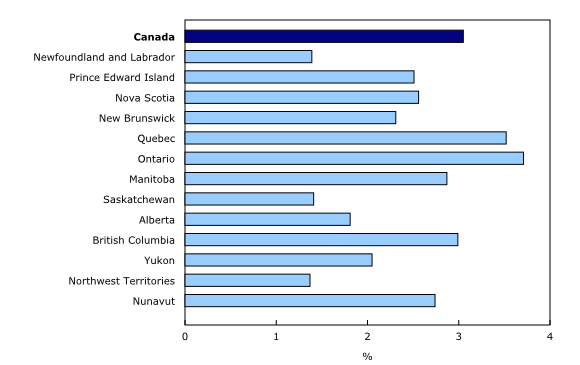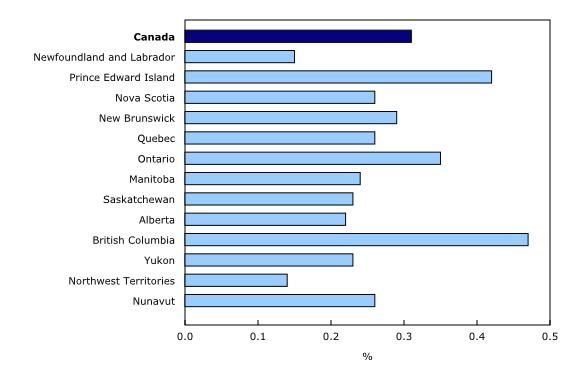Culture and sport activities in the provinces and territories, 2010
Archived Content
Information identified as archived is provided for reference, research or recordkeeping purposes. It is not subject to the Government of Canada Web Standards and has not been altered or updated since it was archived. Please "contact us" to request a format other than those available.
Released: 2015-06-09
Culture
Culture activities accounted for 3.0% of Canada's total gross domestic product (GDP) and 642,486 jobs in 2010. Across the provinces and territories, culture GDP varied in importance from 1.4% of provincial GDP in Newfoundland and Labrador to 3.7% in Ontario. Culture jobs as a share of the total economy ranged from 2.2% to 4.1% among the provinces and territories.
The data come from the first ever Provincial and Territorial Culture Satellite Account, which measures the economic importance of culture and sport in terms of output, GDP and employment (number of jobs) for every province and territory.
Audio visual and interactive media, which includes broadcasting and film and video, was the largest contributor to culture GDP across most of the country. Notable exceptions were Prince Edward Island, Saskatchewan and the territories, where governance, funding and professional support contributed the most to the culture GDP of the province or territory. In Manitoba, written and published works were most important.
Sport
In 2010, sport contributed 0.3% to the national economy GDP and accounted for 0.6% of total jobs in Canada. The contribution of sport GDP to regional economies varied across the country from 0.1% in the Northwest Territories to 0.5% in British Columbia. Sport jobs as a proportion of total jobs in Canada also varied across provinces and territories, ranging from 0.3% in the Northwest Territories to 0.9% in British Columbia.
Organized sport was the largest contributor to sport GDP in Quebec, Ontario, Manitoba, Saskatchewan, Alberta and British Columbia. Education and training was most important in the Atlantic provinces, while governance, funding and professional support contributed the most to the sport GDP of every territory.
Note to readers
The Provincial and Territorial Culture Satellite Account (PTCSA) is a joint initiative of Statistics Canada, all provincial and territorial governments, other federal agencies, numerous cities as well as non-governmental organizations. The PTCSA was developed by applying the 2011 Canadian Framework for Culture Statistics to the Canadian System of Macroeconomic Accounts. The PTCSA provides an accounting framework to identify and measure culture and sport in Canada.
The PTCSA identifies the "culture" and "sport" dimensions across the provincial and territorial economies and provides measures of the economic importance of culture (including arts and heritage) and sport in each province and territory, in terms of output, gross domestic product (GDP) and employment.
These estimates are comparable with similar measures for the overall Canadian economy. The PTCSA estimates for reference year 2010 were derived primarily from the 2010 input-output tables.
Within the PTCSA, culture is defined as a creative and artistic activity, the goods and services produced by it, and the preservation of heritage.
Sport is defined as an individual or group activity often pursued for fitness during leisure time and that may be undertaken for fun or competition. Sport includes recreational sports and physical activities, as well as professional, semi-professional or amateur sport clubs and independent athletes that are primarily engaged in presenting sporting events before an audience.
Culture GDP is the GDP associated with culture activities. This is the value added related to the production of culture goods and/or services across the economy regardless of the producing industry.
Sport GDP is the GDP associated with sport activities. This is the value added related to the production of sport goods and/or services across the economy regardless of the producing industry.
Culture output is defined as culture goods or services produced in the Canadian economy.
Sport output is defined as sport goods or services produced in the Canadian economy.
Culture and / or sport jobs are defined as the number of jobs that are related to the production of culture and/or sport goods and/or services.
The System of macroeconomic accounts module, accessible from the Browse by key resource module of our website, features an up-to-date portrait of national and provincial economies and their structure.
The paper "Provincial and Territorial Culture Satellite Account, 2010" is now available as part of the Income and Expenditure Accounts Technical Series (Catalogue number13-604-M) from the Browse by key resource module of our website under Publications.
Contact information
For more information, or to enquire about the concepts, methods or data quality of this release, contact us (toll-free 1-800-263-1136; 514-283-8300; infostats@statcan.gc.ca) or Media Relations (613-951-4636; statcan.mediahotline-ligneinfomedias.statcan@canada.ca).
- Date modified:



